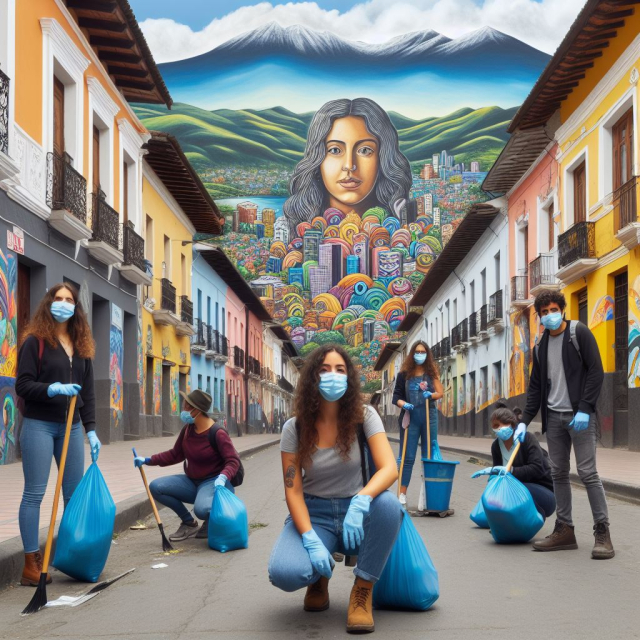Ecuador, a country rich in biodiversity and natural resources, faces a series of challenges related to environmental pollution. In this comprehensive article, we will explore the current pollution situation in Ecuador, its underlying causes, and the strategies implemented to address this important problem. From air and water pollution to solid waste management and ecosystem conservation, we will analyze various aspects of this crucial issue for the country.
Environmental Pollution in Ecuador.
Environmental pollution is a complex and multifaceted problem that affects all regions of Ecuador, from urban areas to rural areas and natural reserves. Pollution can manifest itself in a variety of ways, including air, water and soil pollution, as well as noise and light pollution. These problems have serious consequences for human health, biodiversity and the environment as a whole.
Air Pollution: Urban and Rural Challenges.
One of the most visible forms of pollution in Ecuador is air pollution, especially in densely populated urban areas such as Quito, Guayaquil and Cuenca. Major sources of air pollution include transportation, industry, biomass burning, and forest fires. Common pollutants include suspended particulate matter, nitrogen oxides, sulfur dioxide, and volatile organic compounds.
In rural areas, burning biomass for cooking and heating also contributes significantly to air pollution, especially in indigenous communities and remote areas. Exposure to air pollution can cause a variety of health problems, including respiratory disorders, cardiovascular disease and lung cancer.
Water Pollution: Challenges in Quality and Availability.
Water pollution is another major problem in Ecuador, where industrialization, intensive agriculture and the lack of adequate infrastructure for wastewater treatment contribute to the degradation of rivers, lakes and coastal water bodies. Major water pollutants include agricultural chemicals, industrial waste, untreated sewage, and oil spills.
Water pollution poses serious risks to human health and the environment, as it can contaminate drinking water sources and affect aquatic biodiversity. In rural areas, lack of access to clean and safe water is also a major problem that affects entire communities, especially those located in remote or marginalized regions.
Soil Pollution: Impact on Agriculture and Health.
Soil pollution is a less visible but equally important problem in Ecuador, where deforestation, mining, intensive agriculture, and inadequate solid waste disposal contribute to land degradation. Major soil contaminants include heavy metals, agricultural chemicals, and industrial waste.
Soil contamination can affect the quality of crops and the health of terrestrial ecosystems, as well as pose risks to human health through food contamination and direct exposure to contaminated soil. Proper solid waste management and implementation of sustainable agricultural practices are essential to prevent soil contamination and protect public health.
Pollution Management Strategies in Ecuador.
Given the growing concern about environmental pollution, Ecuador has implemented a series of strategies and policies to address this important problem. Some of the main initiatives include:
Environmental Regulation: Ecuador has environmental laws and regulations designed to control pollution and protect natural resources. These laws cover aspects such as air, water and soil quality, as well as hazardous waste management and biodiversity conservation.
Environmental Monitoring: The Ecuadorian government carries out environmental monitoring programs to evaluate the quality of air, water and soil throughout the country. These programs provide important data on the magnitude and distribution of pollution, allowing appropriate measures to be taken to address identified problems.
Environmental Education: Environmental education plays a crucial role in raising public awareness about the importance of environmental protection and the adoption of sustainable practices. Environmental education campaigns are carried out in schools, communities and the media to promote the conservation and responsible use of natural resources.
Waste Management: Proper management of solid waste is essential to prevent soil and water contamination. Ecuador has implemented recycling, composting, and proper waste disposal programs to reduce the amount of waste that ends up in landfills and bodies of water.
Ecosystem Conservation: The protection of key natural areas, such as national parks and ecological reserves, is essential to preserve biodiversity and mitigate the effects of pollution. Ecuador has established an extensive network of protected areas to safeguard its rich natural heritage.
Environmental pollution is a significant challenge for Ecuador, but it also presents opportunities for action and innovation. Through collaboration between government, civil society and the private sector, it is possible to address pollution problems and work towards a cleaner, more sustainable future for all.
However, continued commitment and concerted action is required to address ongoing environmental challenges and prevent further degradation of the environment. With a combination of effective regulation, environmental monitoring, public education, and sustainable management practices, Ecuador can move toward more equitable and environmentally friendly development in the decades to come.
